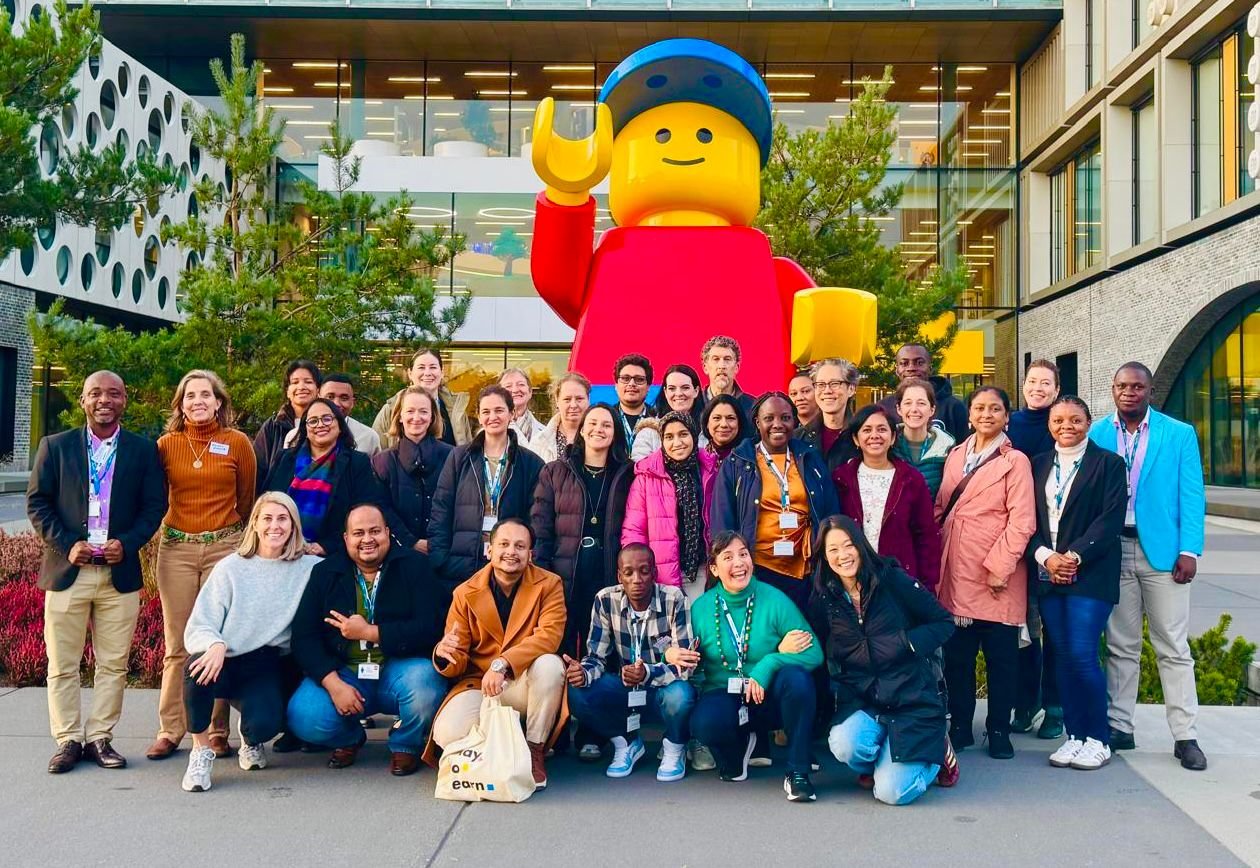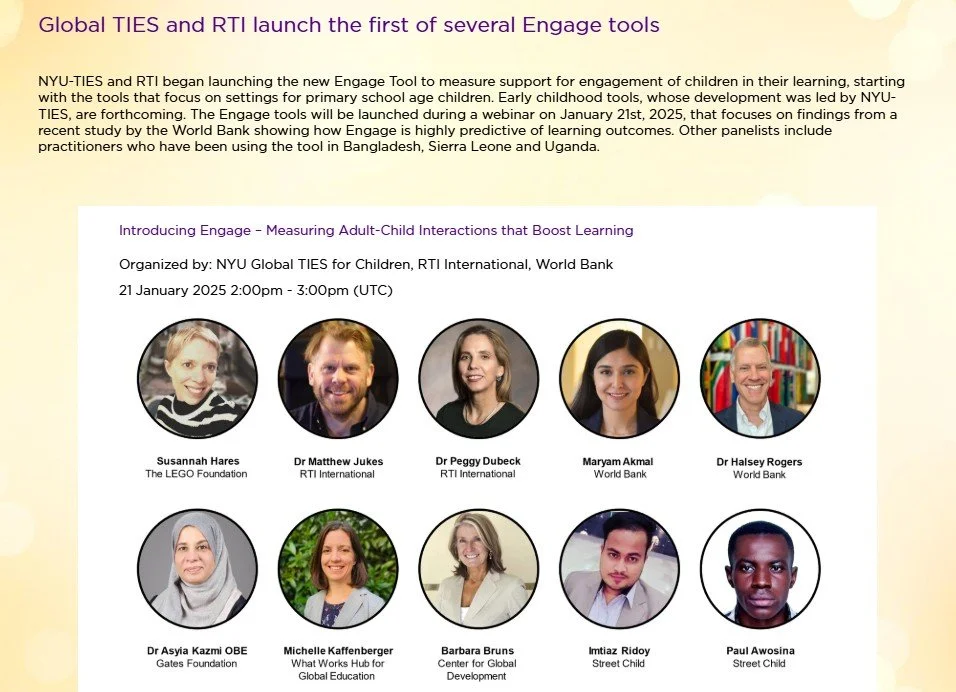Resources
Engage team members participate in the project’s final Comunity of Practice convening
From November 3-6, 2025, Hirokazu Yoshikawa and Sharon Kim represented Global TIES for Children at the final Engage Community of Practice convening, organized by EDC and hosted at the LEGO Foundation headquarters in Billund, Denmark.
Over three days, partners from across the Engage portfolio shared evidence and lessons on strengthening student engagement in early childhood and primary education across diverse contexts.
The sessions focused on:
Insights from implementing and adapting the Engage tools
Trends emerging across countries and developmental levels
How data can drive program improvement and system-level change
This convening wasn’t a “show-and-tell.” It was hands-on, reflective, and honest about what it takes to embed child-centered, playful learning approaches into teaching and learning systems—and sustain them.
Early Childhood Parenting Support – Call Quality Instrument (ECPS-CQI)
The ECPS-CQI instrument was developed in English by Anaga Ramachandranm, Dalia Al Ogaily, Kate Schwartz, Joyce Rafla and Hirokazu Yoshikawa and used to measure the quality of interactions during a phone call with a parent or caregiver. The instrument assesses the domains of relationship with family, responsiveness to family strength, needs, and culture, facilitation of caregiver-child interaction, and active listening. The ECPS-CQI tool has shown promising evidence for reliability and validity, and with caution, it can be used for intended purposes with similar samples/contexts.
Global TIES and RTI launch the first of several Engage tools
NYU-TIES and RTI began launching the new Engage Tool to measure support for engagement of children in their learning, starting with the tools that focus on settings for primary school age children. Early childhood tools, whose development was led by NYU-TIES, are forthcoming. The Engage tools will be launched during a webinar on January 21st, 2025, that focuses on findings from a recent study by the World Bank showing how Engage is highly predictive of learning outcomes. Other panelists include practitioners who have been using the tool in Bangladesh, Sierra Leone and Uganda.
HOLAS Assessment Bank
The Holistic Learning Assessment System (HOLAS) Bank is a curated inventory of educational tools/assessments and relevant monitoring and evaluation (M&E) resources designed for use and/or implemented in Colombia and Peru.
Lessons and Impacts of Ahlan Simsim TV Program in Pre-Primary Classrooms in Jordan on Children’s Emotional Development: A Randomized Controlled Trial
In this brief, Global TIES researchers evaluate the effects of Ahlan Simsim, a television show co-produced by Sesame Workshop and Jordan Pioneers that has been viewed by more than 23 million children across the MENA region, including 57% of displaced Syrians across Jordan, Lebanon, and Iraq.
تقييم فاعلية برنامج "أهلًا سمسم" على التطور العاطفي لدى الأطفال في المرحلة التمهيدية: تجربة عشوائية محكّمة من الأردن
الوصف: في هذا الملخص، يعرض الباحثون في مركز جلوبال تايز (Global TIES) نتائج تقيّم أثر برنامج أهلًا سمسم، وهو برنامج تلفزيوني قامت بإنتاجه ورشة عمل سمسم ومؤسسة جوردن بيونيرز (Jordan Pioneers TV Production)، والذي جذبت حلقاته أنظار أكثر من 23 مليون طفل في منطقة الشرق الأوسط وشمال إفريقيا، بما في ذلك W من النازحين السوريين في الأردن ولبنان والعراق. تعد هذه الدراسة من أولى الدراسات التي من شأنها تقييم الأثر السببي لبرنامج إعلامي 1) تم تصميمه لبلدان الشرق الأوسط المتأثرة بالنزاع السوري وأزمة اللاجئين و 2) يركز على التطور العاطفي لدى الأطفال في المرحلة التمهيدية. وجدت الدراسة تأثيرات إيجابية على الأطفال فيما يتعلق ب: ١) معرفة برنامج أهلا سمسم وشخصياته ٢) التعرّف العاطفي المعبرّ (القدرة على تحديد العواطف المصورة بشكل صحيح) ٣) القدرة على تحديد عواطف الآخرين في سيناريوهات اجتماعية محددة ٤) ذكر استراتيجية التنفس كطريقة إدارة العواطف القوية وهي إحدى استراتيجيات تنظيم العواطف الست التي يركز عليها منهج "أهلًا سمسم".
New Research Shows Substantial Impact on Children’s Learning from Groundbreaking Ahlan Simsim Initiative Combining Educational Media and Early Childhood Services
New Research Shows Substantial Impact on Children’s Learning from Groundbreaking Ahlan Simsim Initiative Combining Educational Media and Early Childhood Services
Conducted by NYU researchers, major studies show the efficacy of Sesame Workshop and International Rescue Committee’s initiative for children affected by conflict and crisis, through a local version of Sesame Street and a new approach to remote preschool
Meet the HEA Phase II Grantee: Madrasati
We hear from HEA Phase II Grantees, Madrasati, as they share about their innovation, journey to scale and experience within the HEA programme. With thanks to HEA mentors NYU-TIES for their work on this video.
Fortalecer los sistemas de monitoreo y evaluación de aprendizaje holístico en contextos de emergencia y crisis prolongada: Colombia y Perú
En esta nota conceptual se describen los marcos, conceptos y métodos del proyecto en el que NYU Global TIES for Children (NYU-TIES) y la Universidad de los Andes están trabajando para fortalecer los sistemas de monitoreo y evaluación de aprendizaje holístico en Colombia y Perú (mayores receptores de familias de refugiados y migrantes venezolanos).
Strengthening holistic learning outcome measurement systems in emergencies and protracted crises: Colombia and Peru
This concept note describes the frameworks, concepts and methods of the project in which NYU Global TIES for Children (NYU-TIES) and the Universidad de los Andes are working to strengthen holistic learning monitoring and evaluation systems in Colombia and Peru (main recipients of Venezuelan refugee and migrant families).
Now More Than Ever: Strengthening systems for social and emotional skills and well-being assessment during the COVID-19 pandemic in Lebanon and Peru
This document outlines the work done by NYU Global TIES to strengthen social and emotional skills and well-being assessment in Lebanon and Peru during the COVID-19 pandemic. It explains the frameworks and concepts, and outlines next steps in those countries.
Meet the HEA Phase II Grantees - iACT
We hear from HEA Phase II Grantees, iACT about their innovation, scaling journey to date and their experience during their time with the HEA programme.
Meet the HEA Phase II Grantees - Cohere
We hear from HEA Phase II Grantees, Cohere about their innovation, scaling journey and time with the HEA programme.
Humanitarian Education Accelerator Learning Synthesis
Over the past 7 years, the Humanitarian Education Accelerator (HEA) has supported 21 innovative and impactful education in emergency and protracted crises (EiEPC) solutions to transition to scale. Support has included financing and capacity building, and has focused on producing actionable evidence.
Many lessons have been learnt throughout the 7 years and 3 cohorts, including lessons for innovators, EiEPC practitioners, donors, and accelerators. We have compiled these lessons into a Learning Synthesis so that global audiences can share in the lessons learnt.
Where to Find Measures
This video is a guide for those interested in assessing holistic child development outcomes through navigating the different resources we have available to find high-quality measurement tools that can provide us with meaningful data. A lot of the resources the video covers are what we, as researchers, look towards as we navigate the largely unknown waters of measure development for children in low-and-middle-income contexts (LMICs).
Creating a Gamified Learning Measurement Tool — the why, the what & the how.
While many Governments have turned to connected education and tech-driven programmes to support continued learning during school closures, there is little available evidence on the impact of distance learning on learning outcomes, especially for children affected by crisis and conflict and regarding holistic learning outcomes. Understanding the impact of the growing number of digital interventions on learning outcomes for these children (both in and outside of the classroom) is crucial to ensuring that no child is left behind in the wake of COVID-19 disruptions. In order to be able to understand how to better support children’s learning, we first need to be able to understand what children know and are able to do. Armed with this information, teachers and educational programmes can then provide more tailored support. The assessment of learning outcomes is therefore key. In response to a clear gap in this area, a new partnership, brokered by Porticus, brought together War Child Holland, NYU Global TIES for Children, and the HEA to interrogate the need for an effective tool to assess learning outcomes across digital learning interventions.
Response to Stress Questionnaire (RSQ) - Niger
The original Response to Stress Questionnaire (RSQ: Connor-Smith et al., 2000) was designed to capture the ways that individuals react to and cope with specific sources of stress, including parental depression, family conflict, and academic stressors. In order to assess local and refugee children’s stress experiences and stress responses in Nigerien public school settings, researchers adapted the child self-report version of the RSQ-Academic Problems (RSQ-AP). It includes two subscales intended to assess: (a) academic problems stress and (b) involuntary engagement response to stress.





















